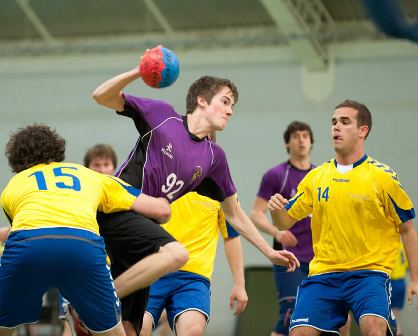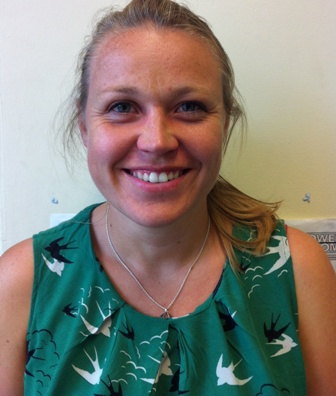
Eyes on the prize: handball is one of the many student experiences...
Imogen Williams: inside university sport
What happens in the groves of academe can be a mystery to the person on the Clapham Omnibus so The Leisure Review spoke to Imogen Williams and invited her to lift the veil on university sport.

Eyes on the prize: handball is one of the many student experiences...
On the day The Leisure Review met the University of Manchester’s sport development manager Imogen Williams the Olympics had been over for just three days and she delighted in reporting that had Team Further and Higher Education been taking part in the Stratford extravaganza it would have finished fifth in the medal table. Whatever your political take on such a statistic, there can be little doubt that “people who are studying or have studied at the UK’s Further and Higher Education institutions” are a key part of elite sport in this country and yet very few people beyond a sector which has its own timetables, its own language and its own agenda know very much about it.
Williams is happy to offer an insight into how sport and physical activity is delivered in her own Higher Education institution (HEI) and to talk about the wider picture but first we asked her to explain how she came to be leading a development team of five in a northern university when she clearly hails from somewhere much further south and significantly less industrial. “I didn’t know what I wanted to do when I was at school and our careers team said ‘You’re good at sport: why not try sports science?’” Having spent a gap year in Australia where she developed her interest in coaching and her “passion for netball was ignited”, Williams studied at MMU Cheshire (formerly Crewe & Alsager College) and developed an interest in performance sport and performance analysis. She also volunteered in the college’s community programmes, working with Connexions. Plus, “I was in the situation a lot of students find themselves in with no idea where I wanted to go.”
Research did not sit well with her and, after the briefest of dalliances with Cheshire East Council, she took a development job with England Netball. That job was down south but her heart, and her permanent home, was by then in Manchester and she applied for and got the sports development officer’s job at the University of Manchester. At this point in her career she admits “I had no idea of the breadth of HE sport.” In 2009 she was promoted to her present role and it is clear that, having seen the opportunities within and beyond the wider HEI sector, her very bright future will not be constrained by a linear career path into facility management.
Having established how she got where she is, and identified that HEI sport is a far broader church than even other sport and leisure professionals realise, Williams tries to define the context in which she works: “If you asked me to give you a definition of ‘student sport’ I don’t think I could give you a streamlined definition; it is such a broad sector. There are so many different drivers within institutions. There are universities which offer sports degrees and places like ourselves, which have no sport specific-degree courses but have a whole sport department set up to manage opportunities and facilities, either our own or in partnership with the local council. Some universities offer scholarships to promising performers and some institutions have none of the above.”
As Williams speaks about the University of Manchester’s relationship with and commitment to sport it is clear she has an eclectic view of what ’sport’ entails. “We provide opportunities for students or staff to play sport recreationally or seriously, or be involved in sport in other roles,” she says. “I do think there is a role for sport both on and off the field. You can play, be sport-specific and build your skills related to that sport but then there’s all the wider benefits of sport: lifelong friendships, leadership skills, the interpersonal skills you can gain, the applied experience of building and running a club. You don’t get all that from the content of a degree. It’s that side of sport that is just so exciting.”
Her department sits within the Directorate for the Student Experience, which Williams sees as a real opportunity to use the power of sport to achieve objectives away from the sporting arena. This power has been recognised beyond the listed town-house on the Oxford Road from which Williams and her colleagues operate. She explains that “the university has a massive social responsibility agenda and we have a requirement to provide both performance and participation outcomes but also to deliver in volunteering and students engaging with local communities”.
With nearly 40,000 students and over 10,000 staff to cater for it is no wonder Williams and her colleagues juggle everything from athletics to zumba, with classes, clubs and ‘come and try it’ sessions all being delivered as part of the year-round programme. The shop window for her work though is the British Universities and Colleges Sports (BUCS) championship, a wonder of regional and national leagues, cups and tournaments, which in the 2011/12 academic year saw 4,712 teams compete. How you can realistically rank Bishop Burton College’s success in the Northern 1a Futsal division against any of Leeds University’s six women’s hockey sides is a matter for conjecture but BUCS seem to manage it with Ultimate Frisbee, Orienteering, Korfball and for the first time this year American Football thrown in.
It is a matter of some pride in the offices of SPORT Manchester that last year the university climbed one BUCS league position to eighth with only the likes of Loughborough, Leeds Metropolitan and Bath, universities where sport has a much higher profile when recruiting new students, above them. “One of our strategic aims is to be in the top 10 of BUCS as an institution,” Williams says. “Realistically, every other university wants to something similar. We are in the top 10 because we want it enough to make the case for the resources to keep us there.” Williams’ competitive edge is certainly visible as she talks about her relationship with peers at other institutions: “It’s a case of who is the best at building the case for resources and then directing them correctly. We look at what expertise we have internally, what links can we make to help us and driving that forwards.” She counts “insightful and dedicated coaches”, a strength and conditioning team, a performance analysis service, and skilled and experienced physiotherapists as the drivers of performance “out on the pitch”.
BUCS competition nationally is “available to 2.3 million students with 100,000 actually involved in competitions”, while at Manchester the Athletic Union has “a body of approximately 3,500 students under its umbrella in 40-plus sports clubs all representing the university, but also providing opportunities for participation level experience of sport”. Internal politics means that the Athletic Union clubs sit within the SPORT department rather than the Students Union, which Williams acknowledges is an unusual arrangement but one that enables the sports developoment team to form really strong links with clubs and the governing bodies which they in turn belong to.
Sport England’s recent change of tack, which sees national governing bodies being forced to focus on participation targets for an age group that demonstrably includes students, places Williams and her team in what they describe as “a great position”. “We have always had a good relationship with NGBs locally but now the new landscape, coupled with the reach of our networks, sees us ideally placed to benefit. Badminton, for example, are rolling out higher-education-specific development officers and we can work with them to drive participation opportunities for our students.”
In a world where ticking boxes has superseded making a difference, and where sports development officers spend more time meeting each other than helping people in sports clubs, it is a joy to meet a woman with drive, passion and a focus on the people she works for. The students of the University of Manchester may have chosen their new alma mater for the rigour of its teaching or the worldwide reputation for academic excellence but Williams and her colleagues are insistent that, if they want it, they can also experience high-quality sport and well-delivered physical activity while they are about it.
The Leisure Review, October 2012
© Copyright of all material on this site is retained by The Leisure Review or the individual contributors where stated. Contact The Leisure Review for details.
Download a pdf version of this article for printing
